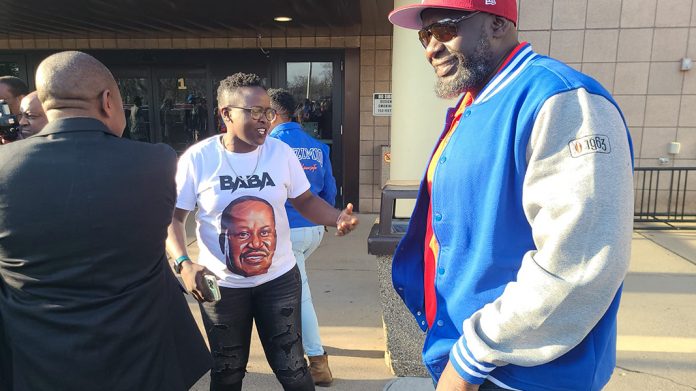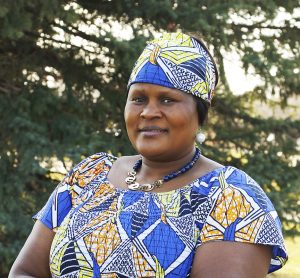

The Raila Odinga presidential campaign deployed top surrogates to meet with Kenyans in Minnesota, as their candidate was forced to cut short his planned 10-day tour of the United States to attend the state funeral of Kenya’s third president Mwai Kibaki.
Gov. Wycliffe Ambetsa Oparanya, the chairman of Azimio la Umoja-One Kenya Alliance, and a team consisting of Gov. James Ongwae of Kisii County and Senators Ledama Olekina and Otieno Kajwang, arrived in Minnesota early Wednesday, where they met with Kenyans in the state to discuss their coalition’s platform and issues important to the diaspora.
Azimio la Umoja-One Kenya Alliance brings together more than 20 political parties, and is crafted along the lines of the National Rainbow Coalition that dislodged the Kenya Africa National Union (KANU) party from power in 2002. Pro democracy leader Raila Odinga of the Orange Democratic Movement (ODM) party, which is part of the Azimio coalition, was on March 12 unveiled as the coalition’s presidential candidate.

Kenya’s general election is on August 9 and Odinga’s main competitor is the country’s current deputy president William Ruto. Ruto’s boss, President Uhuru Kenyatta, is backing Odinga for the presidency.
The quartet said their main agenda besides informing the diaspora on their platform was to also listen to them due their outsized influence on Kenyan politics. Remittances by Kenyans in the United States to Kenya totaled $2.3 billion in 2021, equivalent to the earnings the country makes each year from tourism and coffee combined.
Kenyans in Minnesota account for more than 10% of the almost 150,000 Kenyans in the U.S., and the state is considered a must visit by candidates for high office in Kenya. The politicians are not after the Minnesota Kenyans’ votes, but for their opinion shaping influence on relatives back home.
“We are here because Raila believes you guys are the ones supporting the Kenyan economy, so you are very important to our country, and just us we have traversed the whole of Kenya, we are doing the same here (U.S.),” Senator Olekina said.
“The reason Gov. Ongwae is here,” he added, “is because he believes in Azimio even though he has served his two terms and he is going home.”
“Many of you are sending money to your relatives as we are here, and when Raila becomes president, he has promised no child will be left behind, wouldn’t that lessen your burden?” Olekina asked.
The two-term Gov. Ongwae is term limited and his county of Kisii, and sister county of Nyamira is home to the majority of Kenyans in Minnesota.
“I told my colleagues as we embarked on our U.S. tour that if we don’t come to Minnesota then we have not been to the United States,” Ongwae said as he outlined the 10-point agenda an Azimio has for the country. Part of the agenda is to have 35% of the national budget disbursed directly to county governments.
Senator Otieno Kajwang, who is chair of the Devolution Committee in the Senate, highlighted his committee’s work in making sure funds are devolved to the counties as Ongwae was describing.
“It is not a question of ‘if’ Raila becomes present but ‘when’ he comes president” said Kajwang. “Being that Azimio is working on an inclusive government, you too will be represented.”
Christine Ogongo, a registered nurse from Brooklyn Center came to the United States nine years ago for better opportunities, and was present to hear what message the Azimio team was bringing. She said she did not need much convincing as she believes Raila Odinga represents the best hope for ushering in a performing government.
Ogongo feels strongly that leading presidential candidates should lead the country by example, by being principled and not talking from both sides of their mouth – a jab at Deputy President William Ruto, who regularly throws barbs at the same government he is part of.
“Who among the two has a record of putting the country first?” Ogongo asked. “With Raila I know what to expect from him. He has a track record of years fighting for democracy which I cannot say of (William) Ruto. I will feel okay as I know my family back home will be safe with Raila (Odinga) at state house.”
Raila Odinga’s support network in Minnesota spans the last four Kenyan presidential election cycles, with an ever-growing base as new Kenyans move to the state.
One of those key supporters is Alvin Oyugi of Ramsey, a mechanical engineer at a Twin Cities corporation. He was registered as a voter in his home county in Kenya but in January flew to the Kenyan embassy on Washington to change his polling station to “diaspora.” Kenyans in the U.S. will for the first time be allowed to vote in the presidential election with the Washington embassy, and the country’s two consulates in New York and Los Angeles designated as polling sites.
“I figured it would be cheaper for me to travel to DC than Kenya during the election,” said Oyugi. “I have to make sure that I vote for Baba, as he is the best choice for those of us in the diaspora.”
One of the key requests by those in Minnesota over the years has been the establishment of a Kenyan consulate in the state, given the concentration of Kenyans. Previous administrations have promised to deliver one without success.
Gov. Oparanya, leader of the delegation, addressed the matter head-on. He shared with the audience an idea that Mr. Odinga had shared on Sunday while in Washington before he flew back to Kenya for the state funeral.
“No one else will listen to you except Baba,” thundered Gov. Oparanya. “That is why he has promised that there will be a cabinet level post to deal with diaspora affairs.”
The governor’s point was that the establishment of such a consulate would be easier to establish if diaspora matters were a topic of discussion at cabinet meetings.
One person hoping that Mr. Odinga will deliver on his consulate promise is Alex Isoe Mingate. Mingate works to promote trade between his home county of Nyamira and the United States, and has found linkages between the Washington embassy and the business community to be weak.
“I am hopeful that the government will realize just like Kenya Airways did that Minnesota is important,” Mingate said. “Setting up a consulate here will help them deliver on their promises and put more money in our people’s pockets back home through trade with America.”
About Tom Gitaa Gitaa, Editor-in-Chief
Born and raised in Kenya's coastal city of Mombasa, Tom is the Founder, Editor-in-Chief and Publisher of Mshale which has been reporting on the news and culture of African immigrants in the United States since 1995. He has a BA in Business from Metro State University and a Public Leadership Credential from Harvard’s Kennedy School of Government. He was the original host of Talking Drum, the signature current affairs show on the African Broadcasting Network (ABN-America), which was available nationwide in the United States via the Dish Network satellite service. On the show, he interviewed Nobel laureates such as 2004 Nobel Peace prize winner, Professor Wangari Maathai, the first woman from Africa to win the peace prize and heads of states. Tom has served and chaired various boards including Global Minnesota (formerly Minnesota International Center), the sixth largest World Affairs Council in the United States. He has previously served as the first Black President of the Board of Directors at Books for Africa. He also serves on the boards of New Vision Foundation and the Minnesota Multicultural Media Consortium. He has previously served two terms on the board of the United Nations Association. An avid runner, he retired from running full marathons after turning 50 and now only focuses on training for half marathons.
- Web |
- More Posts(455)








